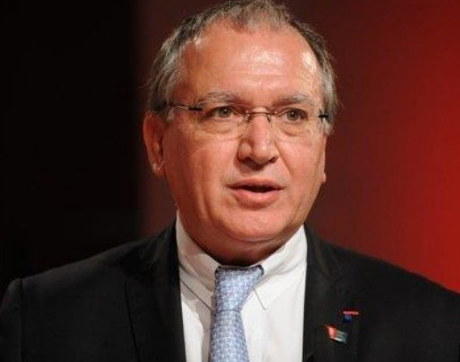
THE media has been rather quiet about the EPO as of late (two weeks after the latest storm), but that doesn't mean that anything at all is improving. SUEPO's new (or newly-aired) Web site now has a translation of a recent report from Thomas Magenheim (11 days old).
Crisis meeting in Munich
No peace at the European Patent Office
By Thomas Magenheim 19 March 2016 - 09:47
Frenchman Benoît Battistelli is out to reform the European Patent Office. But his hard-line methods and his relationship with the staff have caused massive upset in the Office. No talk, then, of a chance for peace to be restored.

EPO boss Benoît Battistelli takes a hard line with the staff. Photo: dpa
Munich – No major showdown, but social peace is still far from breaking out at the European Patent Office (EPO). That at least is the way things look after the results of the latest crisis meeting of the EPO Administrative Council in Munich. The meeting was needed due to Office President Benoît Battistelli having imposed reforms with an iron hand over the past five years, and, at least in the view of staff representatives, has infringed a whole range of fundamental rights. Most recently, two leading officers of the in-house staff union were dismissed, which led to the escalation of the long-running feud between parts of the workforce and Battistelli within the trans-national organization.
Speculations about resignation
Now the Administrative Council has presented the Frenchman with an array of demands aimed at bringing the social situation back under control. There has already been speculation in various media about the resignation or dismissal of the 68-year-old Office President, and rumours of the amount of his golden handshake and names of his successor have been bandied about.
However, the Administrative Council of the European Patent Office has in fact now confirmed Battistelli in office for a further three years, until mid-2019. At the same time, the Supervisory Board has also reined him in, even if this may not last very long. Essentially, Battistelli is required, within three months, to present a reform of the internal investigation guidelines, and in future to submit disciplinary measures, such as the sacking of employees, to the Administrative Council before implementing them. The Council is insisting on fair proceedings, which implies that they were not necessarily so in the past.
The controversial dismissal of two Suepo officials, among them the Munich-based Suepo chief executive Elizabeth Hardon, is ground where the Council would rather not tread, however. As a focus of the meeting, this demand caused sharp conflict between Battistelli and the Chair of the Council, Jesper Kongstad. The Council, as the supervisory body, are taking the line with regard to new cases that the “possibility of an external examination, conciliation, or mediation” should be provided for, according to one of its resolutions. Battistelli is apparently required “to take into consideration” matters such as this; and that does not amount to a strict order.
Personnel demonstrating every month
The response among personnel representatives of the some 7000 employees has been mixed. As a means of bringing peace to the Office, however, the requirements imposed on Battistelli are apparently not being seen as adequate, if only because the disputed sacking of Hardon and another Suepo official will not now in fact be investigated by an independent party. The Suepo representatives do not want to be named, for fear of being blacklisted. This too is something that runs deep. The tense relationship could change if there were to be formal recognition of the union as a staff representative body, but that it still not forthcoming, even though the Administrative Council apparently already called on Battistelli to do this last year.
This requirement is now back on the agenda of the supervisory body, “due to serious concern about the social unrest in the EPO”. The warning from the Council is clear: Disciplinary proceedings against personnel or union representatives would make the possibility of coming to an accord even more difficult. A structural reform of the EPO Boards of Appeal is also a matter of urgency. Personnel representatives are sceptical about Battistelli falling in line this time with the wishes of the Council, and therefore of the 38 EPO Member States. The word is that real peace will only be possible if the President ups and goes. Until then, the staff are going to continue with their resistance, expressed in particular by monthly demonstrations.
Battistelli, too, has his take on reality. “The Council is satisfied with my work”, he declared in an interview with the “Handelsblatt”. He claims that he still has their full backing. His Office, as a trans-national institution, should not be considered from a purely German perspective. This applies in particular to domestic employees’ rights, which do not apply in the EPO. Comments like that do not bode well for the situation easing any time soon.